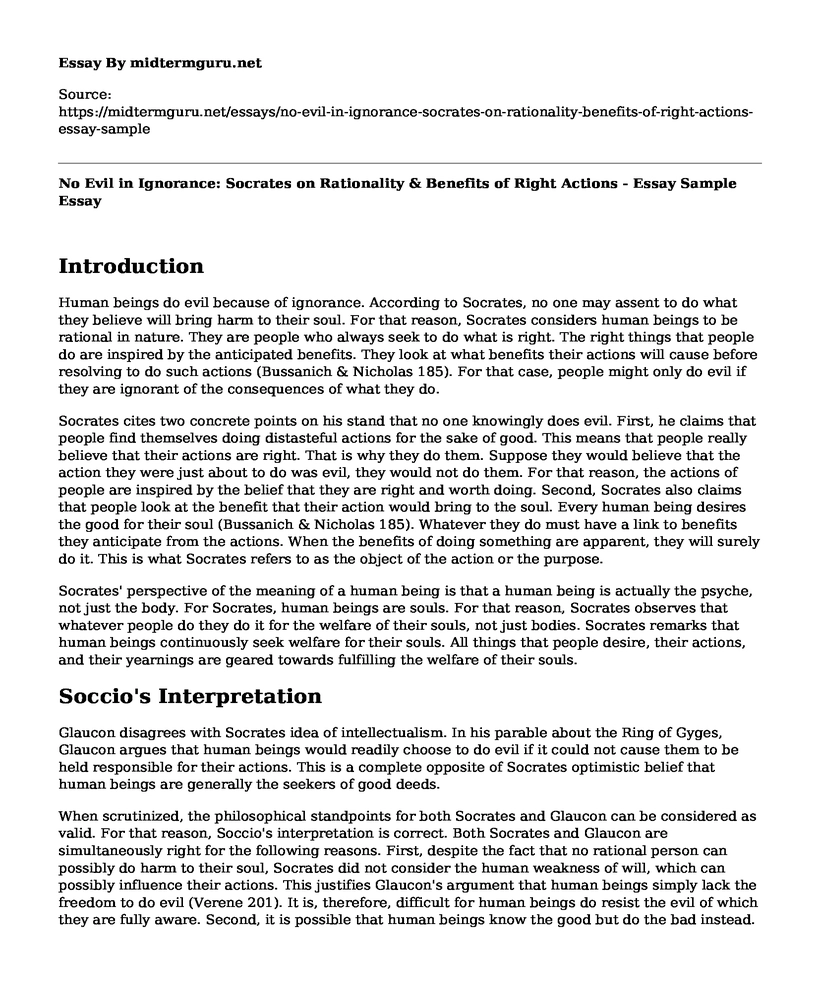Introduction
Human beings do evil because of ignorance. According to Socrates, no one may assent to do what they believe will bring harm to their soul. For that reason, Socrates considers human beings to be rational in nature. They are people who always seek to do what is right. The right things that people do are inspired by the anticipated benefits. They look at what benefits their actions will cause before resolving to do such actions (Bussanich & Nicholas 185). For that case, people might only do evil if they are ignorant of the consequences of what they do.
Socrates cites two concrete points on his stand that no one knowingly does evil. First, he claims that people find themselves doing distasteful actions for the sake of good. This means that people really believe that their actions are right. That is why they do them. Suppose they would believe that the action they were just about to do was evil, they would not do them. For that reason, the actions of people are inspired by the belief that they are right and worth doing. Second, Socrates also claims that people look at the benefit that their action would bring to the soul. Every human being desires the good for their soul (Bussanich & Nicholas 185). Whatever they do must have a link to benefits they anticipate from the actions. When the benefits of doing something are apparent, they will surely do it. This is what Socrates refers to as the object of the action or the purpose.
Socrates' perspective of the meaning of a human being is that a human being is actually the psyche, not just the body. For Socrates, human beings are souls. For that reason, Socrates observes that whatever people do they do it for the welfare of their souls, not just bodies. Socrates remarks that human beings continuously seek welfare for their souls. All things that people desire, their actions, and their yearnings are geared towards fulfilling the welfare of their souls.
Soccio's Interpretation
Glaucon disagrees with Socrates idea of intellectualism. In his parable about the Ring of Gyges, Glaucon argues that human beings would readily choose to do evil if it could not cause them to be held responsible for their actions. This is a complete opposite of Socrates optimistic belief that human beings are generally the seekers of good deeds.
When scrutinized, the philosophical standpoints for both Socrates and Glaucon can be considered as valid. For that reason, Soccio's interpretation is correct. Both Socrates and Glaucon are simultaneously right for the following reasons. First, despite the fact that no rational person can possibly do harm to their soul, Socrates did not consider the human weakness of will, which can possibly influence their actions. This justifies Glaucon's argument that human beings simply lack the freedom to do evil (Verene 201). It is, therefore, difficult for human beings do resist the evil of which they are fully aware. Second, it is possible that human beings know the good but do the bad instead. According to Soccio, human beings can be knowledgeable about what is right but instead choose to do what is evil (Verene 205). For example, people continuously lie despite knowing that telling the truth is the right thing to do. In addition to that, Soccio also observes that people may decide to do evil to protect their reputation and physical health rather than putting more emphasis on the welfare of their soul. For this reason, Glaucon's belief is justified because it reflects the real character of a human being that was not ultimately considered by Socrates.
References
Bussanich, John, and Nicholas D. Smith. The Bloomsbury Companion to Socrates. London: Bloomsbury Academic, an imprint of Bloomsbury Publishing Plc, 2015. Print.
Verene, Donald Phillip. "The sociopath and The Ring of Gyges: A problem in rhetorical and moral philosophy." Philosophy & Rhetoric 43.3 (2010): 201-221. DOI: 10.5325/philrhet.43.3.0201
Cite this page
No Evil in Ignorance: Socrates on Rationality & Benefits of Right Actions - Essay Sample. (2023, Feb 11). Retrieved from https://midtermguru.com/essays/no-evil-in-ignorance-socrates-on-rationality-benefits-of-right-actions-essay-sample
If you are the original author of this essay and no longer wish to have it published on the midtermguru.com website, please click below to request its removal:
- Essay on Robotics and the Job of the Future
- Podcast Analysis Essay on Nature, Nurture, And Our Evolving Debates About Gender
- The Social Aspect of Bullying - Research Proposal
- Foster Care: Is It Preparing Kids for Adult Homelessness? - Essay Sample
- Race, Social Stratification & Ethnic Studies in Contemporary Society - Essay Sample
- Cycle of Violence & Maltreatment: Trauma & Abuse Impacting Adults - Essay Sample
- Diverse People of Frontier Settlement: A Story Beyond English-Speaking Pioneeers - Essay Sample







